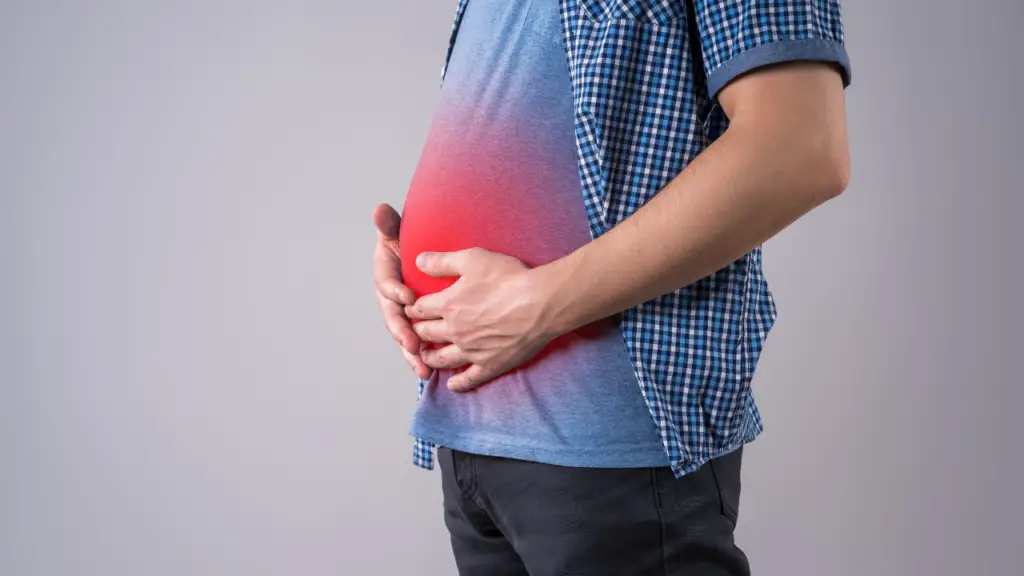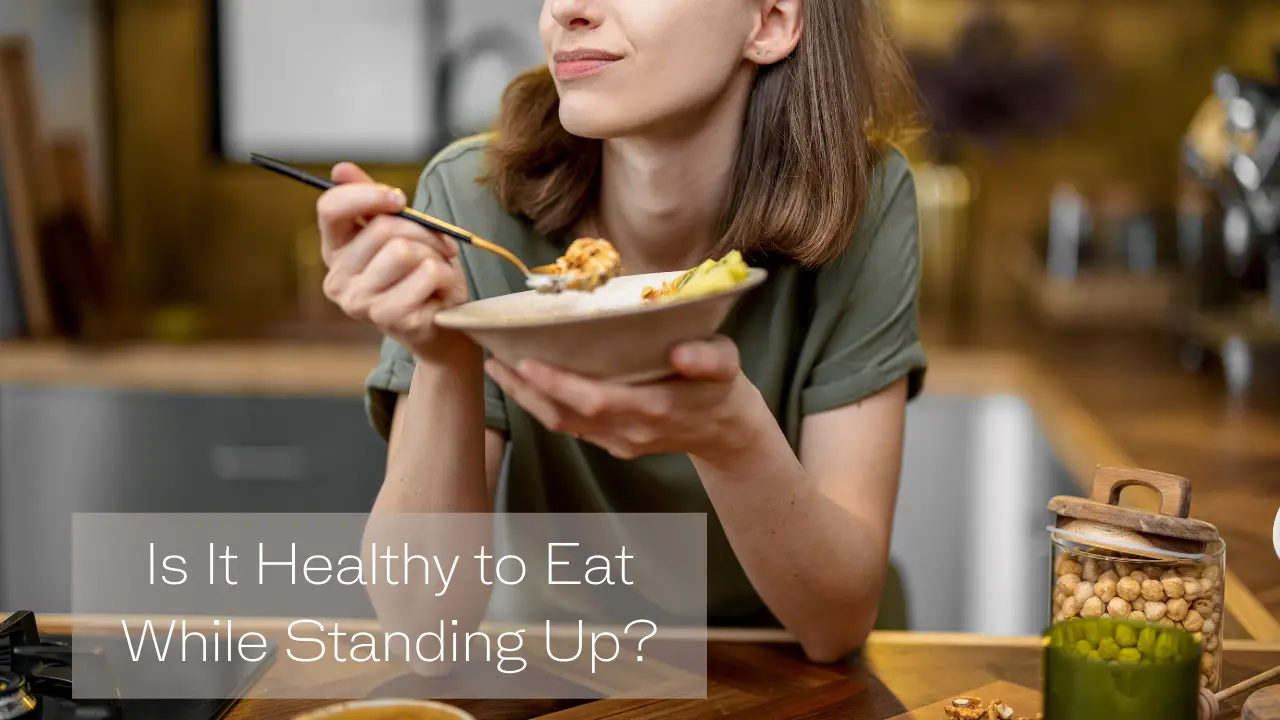Eating meals on the go has become a way of life for many people in this fast-paced world. Either grabbing a bite to eat on the way to work or from vendors serving lunch on the side of the street, rushing meals has become a routine.
Grabbing a quick meal and going back to work sounds like a reality you can't escape anymore. But the thing is, you're not doing your health or gut any favors. Standing and eating your food and moving on to the next thing is typical.
However, it's not too late to change this habit.
Why should you, though? Simply because of the many disadvantages for your health. Read on to find out more!
What Happens When You Eat While Standing?
A lot. It's not only a matter of bad habits; eating while standing can wreak havoc for your body. We've grown up with the saying “posture matters”, and it does.
Your posture determines several things related to your health. There's still room for extensive research on sitting vs. standing while eating. This is what we do know, as of now:
You're Overeating:
Sure, you're burning calories in a standing position, but you're also eating more. In the long run, losing around 20 calories when you eat while standing does no good. Your brain doesn't register that you're full since you're eating more quickly than you would have while sitting.

Furthermore, eating while standing increases your appetite and your chances to overeat. Consequently, you're gaining more calories than you'll gain while sitting down to eat.
You, Will, Feel Hungry Sooner:
Suppose you're standing or moving while eating, which means you're digesting food 30% faster. Sitting down means the food rests in your stomach longer, and you'll feel full for the next several hours.
That isn't necessarily a bad thing. After all, physical exercise is essential for optimal digestion. However, in return, you'll feel hungrier sooner than you would've if you sat down. The hungrier you think you are, the more you eat.
You're Preventing Risk of Bloating:
It's important to note that there are mixed studies on the impact of standing up while eating on digestion. Standing up can lead to faster digestion. However, in some instances, studies showed that standing and eating quickly caused digestive symptoms in several people.

Mainly, these symptoms included gas and bloating. The primary reasons are that you're swallowing more air while standing, and complex foods like carbs are poorly digested. Some researchers stated that standing while eating caused diarrhea due to increased eating speed. Howbeit, more research is needed to establish this.
You're Not Getting Nutrients Properly:
When you're digesting food at a faster pace, it leaves your body more quickly. All the goodness of the food you eat leaves as soon as you eat it. As a result, your body doesn't get the time to absorb the nutrients it needs from the food properly. Ultimately, quicker digestion can also result in poor absorption of nutrients.
What's the Best Position for Eating?
If standing while eating is bad for your health, what's the best position to eat? Before you get inspired by movies to eat while laying down, that's another don't! The ancient Greek and Roman culture have made us fantasize about relaxing on a bed while someone feeds us.
The primary thing you can do for your body and health is sit down to eat. Once you sit down to eat, your digestive system functions effectively. There is insufficient research to prove whether sitting down to eat has more benefits than standing.
Although, the truth is that sitting down is more natural for your digestive system, and you will be less likely to rush your meal.
Indians believe in the power of a position called Sukhasana, the yoga position as we know it.
Is Sitting Down to Eat Always Healthy?
Here's what you should know: sitting down while eating doesn't mean you're in the proper position. Bending over your food, what is known as slouching, can do more harm than good for your body.

Slouching puts your abdominal area under pressure, leading to several symptoms. When there is pressure on your abdominal area, it causes acid reflux. Acid reflux is when food backs up to your digestive tract and causes a burning sensation.
If you're sitting down for a meal, sit upright and not in a hunched position.
Reasons You Should Sit Down During a Meal
The idea of sitting down might go against the lifelong teaching that you need to stay active and keep moving. When eating your meals, however, you should. Take the time to sit down, relax, and eat your meals. It has more benefits than you'd realize.
Prevents Overeating:
Sitting down lets you eat food slowly since you're in a relaxed position. Thus, you're less likely to overeat. It's because as soon as you feel like you've had enough, your belly sends signals to your brain that it is full. On the flip side, you'll receive that message once you've already overeaten.
Lose the Extra Calories:
Conscious eating allows you to watch how much you're eating. Ultimately, having that in control means losing the extra calories you're gaining by eating in a hurry.
Move Those Muscles:
The back-and-forth movement when eating while sitting is fantastic for your body. This way, you're moving your abdominal muscles, hips, and spinal cord. Repeated motion of the abdominal muscles assists digestion. Meanwhile, posture and movement increase flexibility, specifically in the hip bone and spine.
Mindful Eating- Why You Should Practice It More
Taking from Buddhism, mindfulness is an essential part of life. In simple words, it's the art of meditation. While most may not meditate, we understand how to focus on a specific task. Turn your attention from eating and watching TV to only eating, and you're halfway there.
Mindful eating is when you fully concentrate on eating, mentally and physically. Focus all your senses and eliminate distractions. You can practice mindful eating in any position, whether you're standing or sitting.

However, studies show that sitting down increases the chances of mindful eating. When you're eating while standing up, you're more likely to rush it. You would notice that you eat faster and don't focus on your food if you're standing. That is the concept of mindless eating.
Mindfulness, in general, and mindful eating have been shown to have numerous benefits. So, what's up with mindful eating, and why are medical experts talking about it? Here's what happens when you eat your food as attentive as possible:
Psychological Impact:
Slowly eating enhances the feeling of enjoying your food. In other words, you tend to eat whenever you experience emotional or external triggers due to mindless eating. Additionally, mindless eating increases the chances of destructive behaviors such as impulsive eating.
Physical Impact:
Sitting down and having your meal means more time. The brain needs approximately 20 minutes to signal the body to stop eating. As mentioned previously, this allows your brain to send signals timely when you're full. As a result, this decreases the chances of overeating and gaining excessive calories.
Tips to Start an Effective Mindful Eating Habit
For some, mindful eating isn't as hard as it sounds. Although, it is if you're in the habit of quickly eating food, checking your mobile device, or watching TV. It's challenging but not impossible. Start this habit one step at a time.

You'll gradually notice the positivity it brings to your body, mind, and health. We have some ideas to help you plan your next mindful meals:
- Turn off the distractions when you're about to eat, including any devices.
- Eat slowly. Take your time and chew every bite as correctly as you can.
- Don't talk while you're eating. Focus on the food instead. Socializing can wait.
- Immerse yourself into the food. Make your meal the center of attention for your five senses.
- Ask yourself: are you really hungry? If yes, only then should you eat.
Final Words
Eating while standing can have several effects on your body, some of which are harmful. Alternatively, it increases the possibility of overeating and becoming hungry after short periods.
Nevertheless, there's not enough evidence to prove this statement yet. One thing is for sure, whatever position you decide on, practice mindful eating. Give your meals the attention they deserve.
Also, focus on what you're eating more than the position you're eating in. Eat healthily, and you're on the right track.






